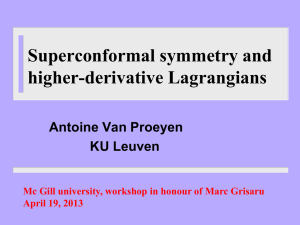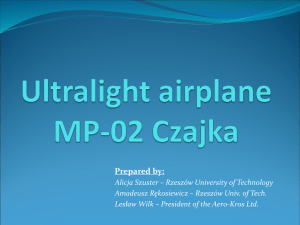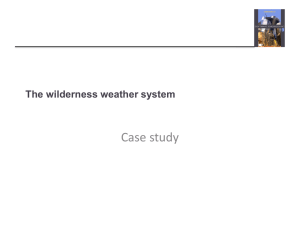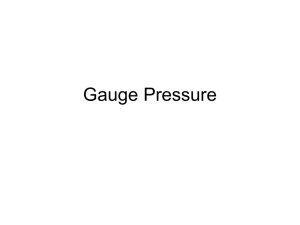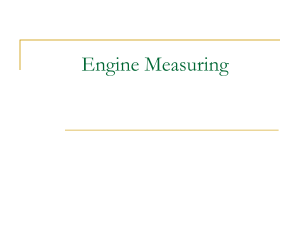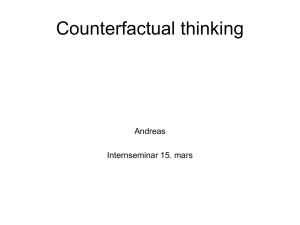The superconformal index for N=6 Chern-Simons theory
advertisement
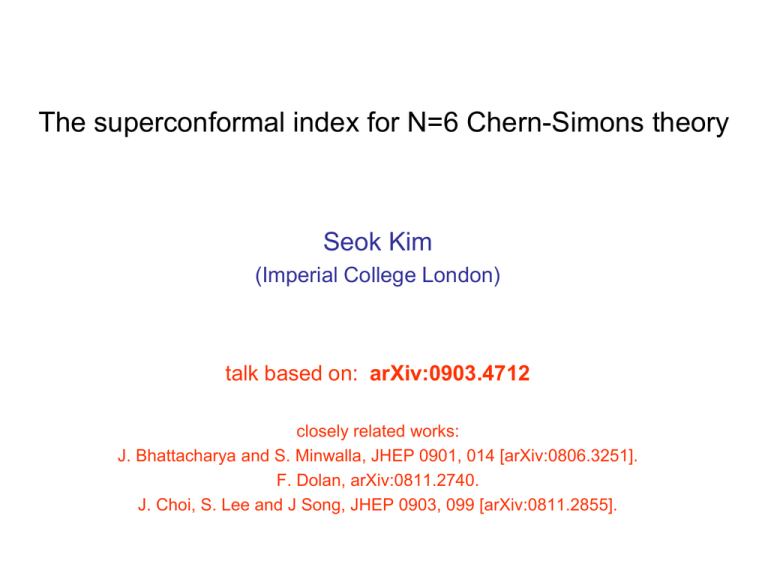
The superconformal index for N=6 Chern-Simons theory
Seok Kim
(Imperial College London)
talk based on: arXiv:0903.4712
closely related works:
J. Bhattacharya and S. Minwalla, JHEP 0901, 014 [arXiv:0806.3251].
F. Dolan, arXiv:0811.2740.
J. Choi, S. Lee and J Song, JHEP 0903, 099 [arXiv:0811.2855].
Motivation
• An important problem in AdS/CFT: study of the “spectrum”
“operator-state map” :
states in Sd = local (creation) operators at r=0
• energy (=scale dimension) & charges, degeneracy
• Encoded in the partition function (if you can compute it…)
superconformal index for N=6 CS
2
AdS/CFT and strong coupling
• AdS/CFT often comes with coupling constants
• Strong-weak duality: limited tools to study string theory & QFT
① CFT reliably studied in weakly-coupled regime
② SUGRA, -model… reliable at strong coupling
• Spectrum acquires “large” renormalization: difficult to study
• Examples:
① Yang-Mills coupling gYM , e.g. (N=4) Yang-Mills
② CS coupling k , e.g. (N=6) Chern-Simons-matter
• This talk: some calculable strong coupling spectrum of N=6 CS
superconformal index for N=6 CS
3
Supersymmetry
• Supersymmetric CFT: energy bounded by conserved charges
states preserving SUSY: saturate the bound
• Supersymmetric Hilbert space: degeneracy.
• Motivations to study supersymmetric states
①
②
③
④
quantitative study of AdS/CFT
supersymmetric black holes
starting points for more elaborate studies (BMN, integrability, etc.)
……
• SUSY partition function is still nontrivial: jump of SUSY spectrum
superconformal index for N=6 CS
4
The Superconformal Index
• States leave SUSY Hilbert space in boson-fermion pairs
• The superconformal index counts #(boson) - #(fermion) .
• “Witten index” + partition function :
• Nice aspects:
① “topological” : index does not depend on continuous couplings
② Can use SUSY to compute it exactly at strongly coupled regime.
(CS coupling k is discrete: 2nd point will be useful.)
superconformal index for N=6 CS
5
Table of Contents
1.
Motivation
2.
Superconformal index for N=6 Chern-Simons theory
3.
Outline of calculations
4.
Testing AdS4/CFT3 for M-theory
5.
Conclusion & Discussions
superconformal index for N=6 CS
6
Superconformal algebra, BPS states & the Index
• Superconformal algebra in d¸3
① super-Poincare: P , J , Q ; conformal: D, K ; special SUSY S .
② R-symmetry Rij : U(N) or SO(2N) for N-extended SUSY in d=4,3
in radial quantization
• Important algebra: gives lower bound to energy (= D)
• For a given pair of Q & S, BPS states saturate this bound.
• Index count states preserving Q,S . qi : charges commuting with Q, S
superconformal index for N=6 CS
7
SCFT and indices in d=4 & d=3
• Index for d=4 SCFT: N=4 Yang-Mills
① does not depend on continuous gYM : compute in free theory
② agrees with index over gravitons in AdS5 x S5
• d=3 SCFT: Chern-Simons-matter theories, some w/ AdS4 M-theory duals
[Bagger-Lambert] [Gustavsson] [Aharony-Bergman-Jafferis-Maldacena] .....
• Most supersymmetric: d=3, N=8 SUSY…
• Next : N=6 theory with U(N)k x U(N)-k gauge group
• (k,-k) Chern-Simons levels: discrete coupling. Index does depend on k.
superconformal index for N=6 CS
8
N=6 Chern-Simons theory and the Index
• N parallel M2’s near the tip of R8 / Zk : dual to M-theory on AdS4 x S7/Zk
superconformal index for N=6 CS
9
N=6 Chern-Simons theory and the Index
• N parallel M2’s near the tip of R8 / Zk : dual to M-theory on AdS4 x S7/Zk
• Admits a type IIA limit for large k:
S1 : Zk acts as translation
CP3
• ‘t Hooft limit: large N keeping = N/k finite:
① weakly-coupled CS theory for small , IIA SUGRA, -model for large
② is effectively continuous [Bhattacharya-Minwalla] (caveat: energy is finite)
superconformal index for N=6 CS
10
Index for free CS theory & type IIA SUGRA
• dynamical fields: scalar CI (I=1,2,3,4), fermions I in
• SUSY Q=Q1+i2- & S : SO(6)R to SO(2) x SO(4), BPS energy = q3 + J3
• ‘letters’ (operators made of single field) saturating BPS bound:
• gauge invariants:
• Free theory: no anomalous dimensions, count all of them.
• 3 charges commute with Q,S: + J3 ; q1, q2 2 SO(4) .
• Index:
superconformal index for N=6 CS
11
Results (for type IIA)
• Index over letters in
&
reps. (x = e- )
index over bi-fundamental
index over anti-bi-fundamental
• Full index : excite `identical’ letters & project to gauge singlets
[Bose (Fermi) statistics]
(also called ‘Plethystic exponential’)
• graviton index: gravitons in AdS4 x S7 to zero KK momentum sector
• Use large N technique: two indices agree [Bhattacharya-Minwalla]
• Question: Can we study M-theory using the index?
superconformal index for N=6 CS
12
Results (for type IIA)
• Index over letters in
&
reps. (x = e- )
• Full index : excite `identical’ letters & project to gauge singlets
• graviton index: gravitons in AdS4 x S7 to zero KK momentum sector
• Use large N technique: two indices agree [Bhattacharya-Minwalla]
• Question: Can we study M-theory using the index?
superconformal index for N=6 CS
13
Gauge theory dual of M-theory states
• M-theory states: carry KK momenta along fiber S1/Zk
• Gauge theory dual [ABJM]: radially quantized theory on S2 x R
• n flux : ( kn , -kn ) U(1) x U(1) electric charges induced.
• Gauge invariant operators including magnetic monopole operators
• No free theory limit with fluxes (flux quantization)
• Finiteness of k crucial for studying M-theory states: p11 ~ k
superconformal index for N=6 CS
14
Localization
• Index : path integral formulation in Euclidean QFT on S2 £ S1 .
• Path integral for index is supersymmetric with Q : localization
1. Nilpotent (Q2=0) symmetry:
generated by translation by Grassmann number
2. Zero-mode ! volume factor: fermionic volume = 0
“Whole integral = 0” ???
3. Caveat: There can be fixed points.
Gaussian ‘approx.’ around fixed point = exact
• More quantitative: One can insert any Q-exact term to the action
• t!1 as semi-classical (Gaussian) ‘approximation’
superconformal index for N=6 CS
15
Calculation in N=6 Chern-Simons theory
• Our choice: looks like d=3 ‘Yang-Mills’ action (on S^2 x S^1 )
superconformal index for N=6 CS
16
Calculation in N=6 Chern-Simons theory
• Our choice: looks like d=3 ‘Yang-Mills’ action (on S^2 x S^1 )
• saddle points: Dirac monopoles in U(1)N x U(1)N of U(N) x U(N) with
holonomy along time circle.
• Gaussian (1-loop) fluctuation: ‘easily’ computable
superconformal index for N=6 CS
17
Results (for M-theory)
• Classical contribution:
• charged fields: monopole spherical harmonics, letter indices shift
• Indices for charged adjoints: gauge field & super-partners
• Gauge invariance projection with unbroken gauge group
Casimir energy
superconformal index for N=6 CS
18
Tests
• Gravity index is factorized as
or…
• Applying large N techniques, gauge theory index also factorizes
•
was proven. [Bhattacharya-Minwalla]
• Nonperturbative: suffices to compare D0 brane part & flux>0 part.
superconformal index for N=6 CS
19
Single D0 brane
• 1 saddle point: unit flux on both gauge groups
• Gauge theory result:
• Gravity: single graviton index in AdS4 £ S7 ! project to p11 = k .
• One can show :
superconformal index for N=6 CS
20
Multi D0-branes
• Flux distributions: With 2 fluxes, {2}, {1,1} for each U(1)N ½ U(N)
• One can use Young diagrams for flux distributions:
{4,3,3,2,1}
• ‘Equal distributions’ : like
or
• monopole operators in conjugate representations of U(N) £ U(N) [ABJM]
[Betenstein et.al.] [Klebanov et.al.] [Imamura] [Gaiotto et.al.]: easier to study
• ‘Unequal distributions’ : like
or
• monopole operators in non-conjugate representations, unexplored
superconformal index for N=6 CS
21
Numerical tests: 2 & 3 KK momenta
• Two KK momenta: k = 1
monopole operators in non-conjugate representation of U(N) x U(N)
chiral operators with 0 angular momentum [ABJM] [Hanany et.al.] [Berenstein et.al.]
superconformal index for N=6 CS
22
Numerical tests: 2 & 3 KK momenta
• Two KK momenta: k = 2
superconformal index for N=6 CS
23
Numerical tests: 2 & 3 KK momenta
• Two KK momenta: k = 3
superconformal index for N=6 CS
24
Numerical tests: 2 & 3 KK momenta
• Two KK momenta: k = 3
• Three KK momenta: k=1
superconformal index for N=6 CS
25
Conclusion & Discussions
• Computed superconformal index for N=6 CS, compared with M-theory
• Captures interacting spectrum: k dependence
• Full set of monopole operators is very rich (e.g. non-conjugate rep.)
• Crucial to understand M-theory / CS CFT3 duality
• More to be done:
1. Direct understanding in physical Chern-Simons theory? [SK-Madhu]
2. Application to other Chern-Simons: e.g. test dualities using index
superconformal index for N=6 CS
26
Conclusion and Discussions (continued)
• N=5 theory with O(M)k x Sp(2N)-k [ABJ] [Hosomichi-Lee-Lee-Lee-Park]
‘Parity duality’ in CFT (strong-weak) : can be tested & studied by index
• N=3 theories w/ fundamental matter [Giveon-Kutasov] [Gaiotto-Jafferis] etc.
Seiberg duality, phase transition : study of flux sectors
Implications to their gravity duals?
• non-relativistic CS theory: monopole operators important [Lee-Lee-Lee]
superconformal index for N=6 CS
27
Conclusion & Discussions (continued)
• Last question: Any hint for N3/2 ?
• In our case, degrees of freedom should scale as
• Strong interaction should reduce d.o.f. by 1/2 .
• Our index keeps some interactions
superconformal index for N=6 CS
28
